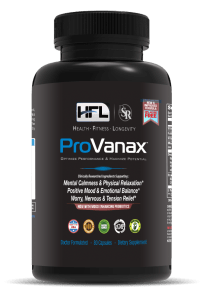Reduce feelings of worry and anxiety
ProVanax™ 20+ year, time-tested formula is designed to help improve mood enhancing “happy chemicals.” Reduce feelings of worry and anxiety, while promoting a healthy stress response that results in a relaxed body and confident mind..
ProVanax™ helps promote:
- Less worry, anxiety & nervousness
- Physical relaxation and less tension
- Positive mood & emotional balance
- More confidence & mental calmness
- Faster, deeper & more restful sleep
Practice Relaxation Techniques
Anxiety is more than just a feeling. It’s the body’s physical “fight or flight” reaction to a perceived threat. Your heart pounds, you breathe faster, your muscles tense up, and you feel light-headed. When you’re relaxed, the complete opposite happens. Your heart rate slows down, you breathe slower and more deeply, your muscles relax, and your blood pressure stabilizes. Since it’s impossible to be anxious and relaxed at the same time, strengthening your body’s relaxation response is a powerful anxiety-relieving tactic.
Effective relaxation techniques for relieving anxiety include:
Deep breathing. When you’re anxious, you breathe faster. This hyperventilation causes symptoms such as dizziness, breathlessness, lightheadedness, and tingly hands and feet. These physical symptoms are frightening, leading to further anxiety and panic. But by breathing deeply from the diaphragm, you can reverse these symptoms and calm yourself down.
Progressive muscle relaxation can help you release muscle tension and take a “time out” from your worries. The technique involves systematically tensing and then releasing different muscle groups in your body. As your body relaxes, your mind will follow.
Meditation. Research shows that mindfulness meditation can actually change your brain. With regular practice, meditation boosts activity on the left side of the prefrontal cortex, the area of the brain responsible for feelings of serenity and joy. Try the Ride the Wild Horse meditation, part of HelpGuide’s free Emotional Intelligence Toolkit.

Get enough sleep. Anxiety and worry can cause insomnia, as anyone whose racing thoughts have kept them up at night can attest. But lack of sleep can also contribute to anxiety. When you’re sleep deprived, your ability to handle stress is compromised. When you’re well rested, it’s much easier to keep your emotional balance, a key factor in coping with anxiety and stopping worry. Improve your sleep at night by changing any daytime habits or bedtime routines that can contribute to sleeplessness.
Limit caffeine. Stop drinking or at least cut back on caffeinated beverages, including soda, coffee, and tea. Caffeine is a stimulant that can trigger all kinds of jittery physiological effects that look and feel a lot like anxiety—from pounding heart and trembling hands to agitation and restlessness. Caffeine can also make GAD symptoms worse, cause insomnia, and even trigger panic attacks.
Avoid alcohol and nicotine. Having a few drinks may temporarily help you feel less anxious, but alcohol actually makes anxiety symptoms worse as it wears off. While it may seem like cigarettes are calming, nicotine is actually a powerful stimulant that leads to higher, not lower, levels of anxiety.
Eat right. Food doesn’t cause anxiety, but a healthy diet can help keep you on an even keel. Going too long without eating leads to low blood sugar—which can make you feel anxious and irritable—so start the day right with breakfast and continue with regular meals. Eat plenty of fruits, and vegetables, which stabilize blood sugar and boost serotonin, a neurotransmitter with calming effects. Reduce the amount of refined carbs and sugar you eat, too. Sugary snacks and desserts cause blood sugar to spike and then crash, leaving you feeling emotionally and physically drained.




Reblogged this on Global Health and Wellness and commented:
Eat right. Food doesn’t cause anxiety, but a healthy diet can help keep you on an even keel. Going too long without eating leads to low blood sugar—which can make you feel anxious and irritable—so start the day right with breakfast and continue with regular meals. Eat plenty of fruits, and vegetables, which stabilize blood sugar and boost serotonin, a neurotransmitter with calming effects. Reduce the amount of refined carbs and sugar you eat, too. Sugary snacks and desserts cause blood sugar to spike and then crash, leaving you feeling emotionally and physically drained.